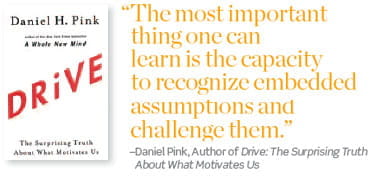Author Daniel Pink says right-brain skills and intrinsic motivations are key for modern leaders.

Why has right-brain thinking become more important in the workplace?
D.P. The abilities that matter less are abilities characteristic of the left side of the brain—the logical, linear, sequential, analytical, SAT, spreadsheet kind of abilities. You have to have them, but they’re not sufficient. The ones that matter most are the right-brain abilities—artistry, empathy, design, big-picture thinking, things that are hard to outsource, hard to automate, and that help create something the world didn’t know it was missing.
How can organizations use this knowledge to innovate?
D.P. What you want are almost radical levels of autonomy. The [software] company Atlassian gives people one day, once a quarter, to work on anything they want and show it to the company 24 hours later. That day of autonomy has led to ideas for new products and fixes for existing products. Steve Jobs at Apple said, ‘I want to put a dent in the universe.’ He said, ‘I want to make a computer for right-brain people, not only for left-brain people.’ Google said, ‘We want to organize the world’s information and make it accessible.’ If you have that sense of purpose, and you give people autonomy, they will do amazing things.
You’ve spoken about people telling their stories. How can storytelling be used in the workplace?
D.P. We see the world as a series of episodes. People leave their office and come home, and their spouse or their partner says, ‘How was your day?’ They don’t whip out a PowerPoint presentation with pie charts. They narrate it. Storytelling has been too often banished from organizations as something that is not serious or is deceitful. Effective leaders are very good at hearing other people’s stories and creating a story that allows people to see themselves as part of that narrative and an important force and protagonist in moving that narrative forward.
What advice would you give to the educators of future teachers and business leaders?
D.P. The most important thing one can learn is the capacity to recognize embedded assumptions and challenge them. Our embedded assumption is that most people wouldn’t do very good work unless they were rewarded or punished for it. Maybe people actually want to do great work. They’re inherently active and engaged, as long as they’re treated fairly. Management is something somebody invented. Do we even need something like management? School is something human beings invented to address a certain problem at a certain time. It doesn’t mean what a school is should never change. Education is about challenging assumptions, challenging premises, and surfacing really false premises.




